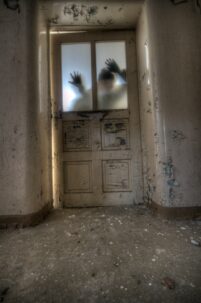The following is an excerpt from my upcoming book: Hope Rising, What to Do When Life Hits the Fan. This post is part of one chapter, and I would appreciate your input. You can email me at KurtBubna@gmail.com. Thank you for your help.
Can you remember the last time you were afraid?
Maybe it was during a near-death experience in your car. Perhaps it was at 30,000 feet when your plane hit an air pocket, and you hadn’t paid attention to the “keep your seat belt fastened at all times” warning, and suddenly your head was jammed into an air vent.
Possibly it was during a movie like World War Z or A Quiet Place, and you still wake up in the middle of the night screaming.[1] (I shrieked like a baby pig in both of those movies.)
Whatever your last fear experience was, I’m sure it still makes your pulse race and your heart skip a beat when you think about it.
Fear is like a vise grip on our minds.
Terror puts our guts into knots of anguish. It squeezes our hearts. It hurts our faith. It wounds our souls. It’s like getting punched in the solar plexus because it takes our breath away.
I have a fear of small, dark confined spaces. (My blood pressure is rising just thinking about it.) I refuse to admit that I’m claustrophobic, but I’d rather die than be bound by duct tape and thrown into a small closed space.
One study indicates that anywhere from five to seven percent of the world population is affected by severe claustrophobia.[2] That’s 350 million or so people who will do anything to avoid a crowded elevator. I am one of them.
Some time ago, I had the experience of a lifetime. My mom and I went on a self-guided tour of the Holy Land (meaning I drove the car, and she drove me crazy with her directions). We visited everything from the Dead Sea to the Old City of Jerusalem. It was an incredible trip.
One afternoon I decided to visit Hezekiah’s Tunnel. King Hezekiah dug a tunnel underneath the City of David in ancient times. He created this 1,750-foot channel in the mountain to provide water for Jerusalem before an impending siege by his enemy, the Assyrians.[3] Trekking through this underground passageway in knee-deep water is a highlight for many visitors to Jerusalem.
The day before, I’d gone to check it out, but hundreds of students were in line, and the wait was too long. When I returned the following day, I was surprised to find almost no one in line for a ticket. I thought, Cool! I can get through this in no time and without any crowds. Wrong. What was I thinking? It’s a small, tight, and dark tunnel! As it turned out, it was one of the worst moments of my life.
Only three things are required for this tunnel-of-death expedition: water-worthy shoes, a flashlight, and nerves of steel. What the heck, two out of three ain’t bad, right?
After paying my twenty shekels, I entered the security gate and began my descent. Keep in mind, I’m alone, and my only companion is a pathetic penlight as I go far below the surface of the Earth—down what seemed like thousands of steps.
So far, so good. However, I did pause at one moment and wonder: What if my battery dies or I drop my flashlight? That would be bad. Really bad. Then my mind started going a bit wonky. What if there’s an earthquake? What if there’s a terrorist attack? What if somebody drops a bomb on Jerusalem and I’m trapped down here for days or weeks? What if Jesus comes back and I’m too deep to get raptured?
Boldly (or foolishly) I pressed on deeper and deeper into the abyss. I finally hit the bottom of the steps and entered through a small opening into the actual water-filled tunnel. The water felt refreshing, but complete darkness now surrounded me. I found myself confined by rock walls that seemed to squeeze the air out of my lungs.
I started to panic. There’s probably very little oxygen down here! I bet this water is filthy! What if I never see my wife and kids again?!
I’m not proud of the way I felt. Being alone was a mixed blessing. On the one hand, I was glad no one was there to see me lose it, but I would have held a complete stranger’s hand if only someone, anyone, were present. I’m not sure how far I got before I turned around and ran back to the steps and freedom.
Immediately as I exited the tunnel, two couples greeted me. In fact, I surprised them as I bolted out of the passageway like a bullet out of a gun. I’m sure I looked like a ghost, and the woman in the back of this small group said, “There’s no way in #&^% I’m going in there!” I nodded my heartfelt agreement, grunted something about death by darkness, and ran past them up the stairs and to the nearest exit.
Fear sucks. Physically, emotionally, mentally, and experientially, it robs us of so much.
Even if you are an adrenaline junky who loves doing crazy things solely for the rush, you’d still have to admit that fear can kill you. On the good-bad scale of things, fear is evil unless it’s used for good. Meaning, unless you have a reasonable fear that keeps you from doing unreasonable things, fear is bad. Sometimes tragically bad.
Unfounded fears produce unnecessary reactions that cripple us and cause us to withdraw from living the life God has planned for us. Too often we say no to God-given opportunities because we’re afraid. Too often we miss the chance to develop and grow because we’ve chosen to play it safe and avoid any risks.
I’m the last guy on the planet to give you a hard time about being afraid. I get it. If you struggle with fear, we are brothers from a different mother. You’ll get no finger-wagging or shaming looks from me. But we don’t have to stay stuck in the grip of terror.
We can live free. We can grow. We can choose to “fear not” rather than live bound by “fear knots.”
To do so we need a change in our minds. Fear is often the result of faulty thinking. We develop destructive mental habits that become emotional ruts. I heard someone once say, “You fight bad thoughts with good thoughts.” I couldn’t agree more.
We must teach our minds to dwell on whatever is excellent and admirable and to focus our thoughts on all that is true, holy, just, pure, lovely and worthy of praise.[4] The Bible also says, “You will keep in perfect peace all who trust in You, all whose thoughts are fixed on You!”[5] In other words, a God-fixed mind is a peace-filled mind.
We also need to train ourselves to pray and seek God when terror strikes. When the unexpected happens (and it will), to whom do you turn first? Does your heart run toward God in prayer, or do you run to the medicine cabinet for a Valium?
Prayer is powerful. Prayer takes us to the One who is able to rescue us. Prayer shifts our focus from the earthly to the heavenly. The Apostle Paul wrote this to the Church: “Do not be anxious about anything, but in every situation, by prayer and petition, with thanksgiving, present your requests to God. And the peace of God, which transcends all understanding, will guard your hearts and minds in Christ Jesus.”[6]
One last thing; we must learn to lose our fears in the sea of God’s love. In many ways, the root of all fear is spiritual. We doubt the goodness of God. We question the love of Jesus. We wonder if God is indeed mindful of us and our situation. But “perfect love casts out fear.”[7]
Knowing we are deeply loved by a Father who always has our best interest at heart is critical to living an epic life that overcomes fear.

[1] A 2013 apocalyptic zombie film starring Brad Pitt; A Quiet Place is a 2018 American post-apocalyptic horror film directed by John Krasinski.
[2] http://en.wikipedia.org/wiki/Claustrophobia
[3] See 2 Kings 20:20
[4] Philippians 4:8
[5] Isaiah 26:3, NLT
[6] Philippians 4:6-7
[7] I John 4:18



